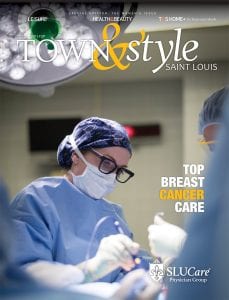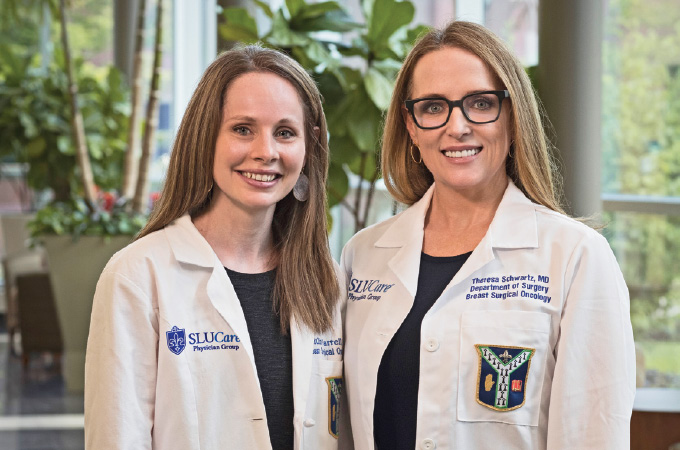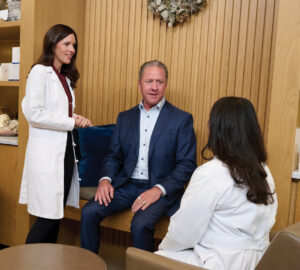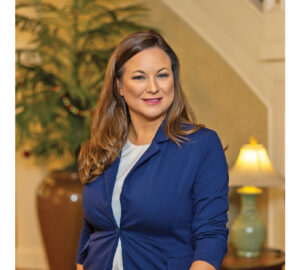Veterinarian Dr. Cynthia Grebel was weeding her garden one day when she felt discomfort in one of her armpits. She noticed a lump in the area, so she scheduled a mammogram and was sent for a biopsy that confirmed intraductal carcinoma, a common form of breast cancer.
Although she had a thorough understanding of cancer processes, the news still hit hard. “I’m 34, below the age when doctors normally recommend yearly mammograms, so I’m fortunate to have found it when I did,” Grebel says. SLUCare breast surgeon Dr. Theresa Schwartz performed a bilateral mastectomy at SSM Health Saint Louis University Hospital, and Grebel underwent chemotherapy, radiation and physical therapy as well. She plans to have reconstruction surgery later this year.
Grebel says the care provided by Schwartz and the SLUCare team was highly individualized from the start. Once the diagnosis was confirmed, Schwartz met with the patient and her husband to talk through all of their questions and concerns. “She lives and breathes this kind of personal care,” Grebel says. “She is truly passionate about it. She recognized there would be anxiety in my situation and went far above normal expectations.” Schwartz also worked closely with her on a timeline to resume normal activities. “She understood my personality and knew I’d be happiest going back to work as soon as it was safe,” Grebel notes. “Getting back on my feet and occupying my mind was important to my recovery.”
 Schwartz says the first step in combating breast cancer is for the patient to pay attention to any changes in the breasts and surrounding tissue. Lumps, discomfort, unexpected differences in the skin or nipple, and abnormal discharge are some of the signs to look for, she notes. It’s important to consult a doctor to discuss symptoms and dispel misconceptions. “Women often worry that any problem with a breast automatically means cancer, but it very often doesn’t,” Schwartz says. “And if it is cancer, today’s care is highly advanced and personalized. We have so much tumor biology information and high-tech diagnostic imaging that it’s easy to know for sure which treatment plan a woman needs.” Patients also can access cancer counseling services to help them navigate the journey, she adds.
Schwartz says the first step in combating breast cancer is for the patient to pay attention to any changes in the breasts and surrounding tissue. Lumps, discomfort, unexpected differences in the skin or nipple, and abnormal discharge are some of the signs to look for, she notes. It’s important to consult a doctor to discuss symptoms and dispel misconceptions. “Women often worry that any problem with a breast automatically means cancer, but it very often doesn’t,” Schwartz says. “And if it is cancer, today’s care is highly advanced and personalized. We have so much tumor biology information and high-tech diagnostic imaging that it’s easy to know for sure which treatment plan a woman needs.” Patients also can access cancer counseling services to help them navigate the journey, she adds.
According to SLUCare breast surgeon Dr. Kaitlin Farrell, women benefit greatly from the fact that breast cancer therapy is much more customizable than it used to be. “It’s a very personal decision; there are a number of cancer types, so different methods are needed to address them,” she notes. The right combination and timing of treatments depend on factors like age, life stage, whether the patient has been pregnant or plans to be, and other preferences. “Some women carry gene mutations that put them at increased risk of recurrence, and they may elect to have both breasts removed,” Farrell says. “Others want to take a more conservative approach. In any case, as soon as a diagnosis is reached, we have a long conversation about treatment options, and the patient is very involved in these decisions.”
Grebel recently finished her course of radiation and says she feels optimistic about the future. “You can try to prepare mentally for this experience, but it’s difficult,” she notes. “What makes it easier is health professionals who see you as a person, not just a patient. I spoke with other doctors about treatment, but after meeting with the SLUCare team, I knew they would be my choice.”
SLUCare Physician Group provides breast cancer care that addresses the needs of the whole person. Pictured on the cover: Dr. Theresa Schwartz in the operating room. For more information, call 314.577.6131 or visit slucare.edu/breast-surgery.
Cover design by Julie Streiler | Cover photo courtesy of SLUCare Physician Group
Pictured at top: SLUCare breast surgeons Dr. Kaitlin Farrell and Dr. Theresa Schwartz
Photo courtesy of SLUCare Physician Group









